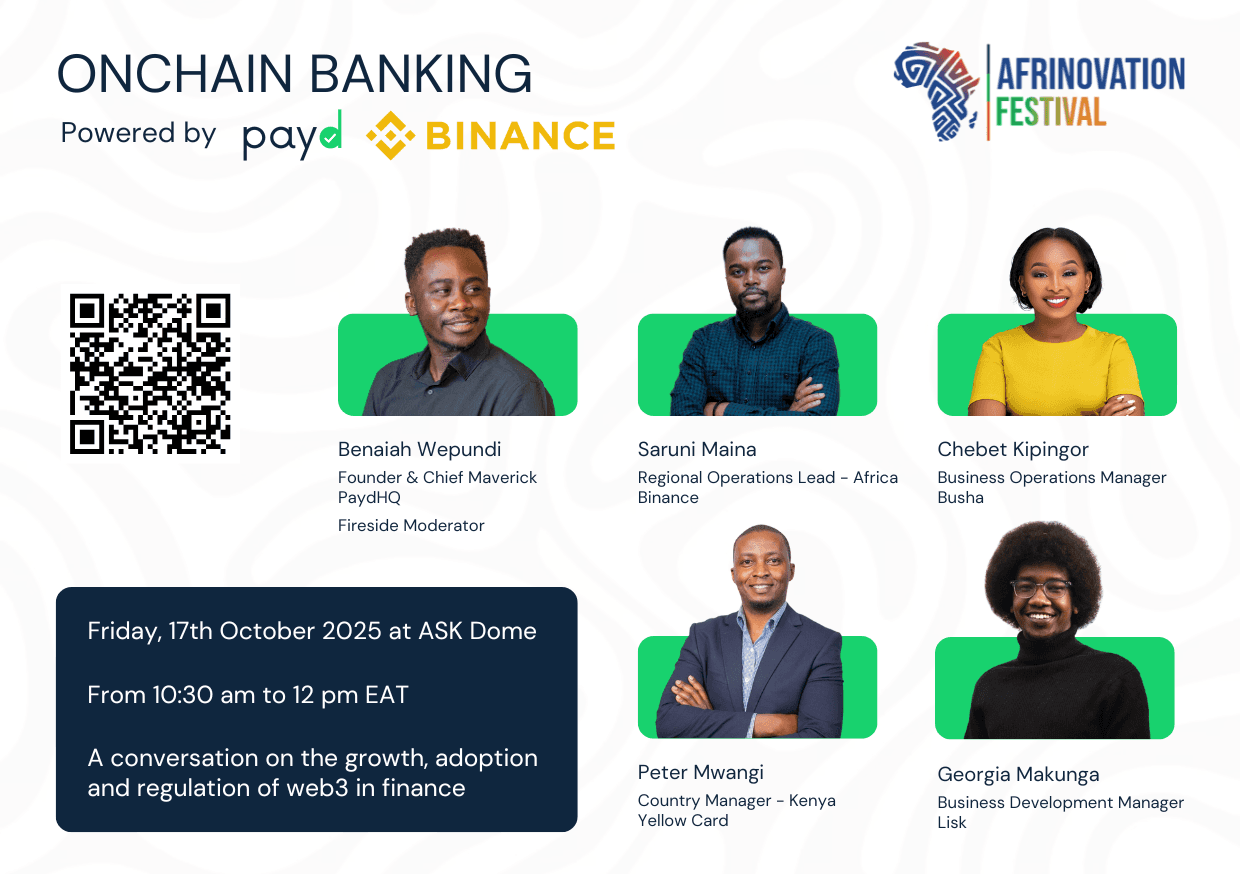Africa's Onchain Moment
Last Friday at the Afrinnovation Festival 2025, Payd hosted a fireside conversation on Onchain Banking - a powerful exchange of ideas featuring some of the brightest operators shaping the continent's financial future.
In partnership with Binance, and joined by leaders from Busha, Yellow Card, and Lisk, the session brought together a rare mix of builders, regulators, and visionaries unpacking one big idea:
What if the next era of banking isn't built in banks - but onchain?
Moderated by Benaiah Wepundi, Founder and Chief Maverick of PaydHQ, the conversation explored how blockchain is evolving from a payment mechanism into the coordination layer for global finance - where money moves freely, settlements happen in seconds, and financial access becomes truly borderless.
The Context: Regulation, Innovation, and Convergence
2025 has marked a turning point for the financial ecosystem across Africa and beyond:
- Kenya has passed the Virtual Asset Service Provider Bill, a landmark step in bringing digital assets into formal regulation.
- Ghana's Central Bank has suspended several fintech licenses tied to virtual asset activities, signaling a move toward stronger oversight.
- The U.S. GENIUS Act has become the first federal framework for stablecoin regulation.
- Global banks - from JPMorgan and Citi to Standard Chartered - are piloting tokenized deposits and bank-issued stablecoins.
- Meanwhile, African fintechs like Binance, Busha, and Yellow Card are making stablecoin-powered payments and remittances faster, cheaper, and more accessible than ever before.
Together, these shifts reveal a new reality: finance is becoming programmable, interoperable, and global by design - and Africa is leading the way.
What Onchain Banking Really Means
The phrase "onchain banking" can sound abstract. But at its core, it's about reimagining how money moves - not replacing banks, but rearchitecting the financial plumbing to make it faster, more open, and more human.
In practice, that means:
- Borderless, near-instant value transfer - money that moves as quickly as messages.
- Reduced settlement risk - removing intermediaries and friction in global transactions.
- Open access to liquidity and products - where a Nairobi-based freelancer can earn in USDC and a Berlin-based developer can cash out instantly in cEUR.
- Financial inclusion by design - creating systems that work for distributed, digital-first workforces and entrepreneurs everywhere.
This is the world Payd is building toward: a financial OS for borderless work, where freelancers, creators, and global teams can get paid, spend, and manage money seamlessly across 80+ countries.
The Conversation: From Policy to Practice
1. Regulation as an Enabler
Regulation is no longer the enemy of innovation - it's becoming the foundation of trust. The panel discussed how frameworks like Kenya's VASP Act and the EU's MiCA are creating pathways for licensed exchanges, custodians, and payment providers to operate safely, while still allowing innovation to thrive.
2. Stablecoins and Tokenization
Stablecoins have quietly become the new financial infrastructure for global money movement. From Busha's retail adoption to Yellow Card's enterprise payouts, stablecoins are being used for payroll, remittances, and B2B payments - providing liquidity where banks often cannot.
Meanwhile, tokenization is turning once-illiquid assets - like treasuries, invoices, or real estate - into digital instruments tradable 24/7, enabling new forms of access and yield.
3. Interoperability and Infrastructure
As Lisk's Georgia Makunga noted, the next big unlock isn't new chains - it's better connectivity between them. Layer 2 protocols, account abstraction, and cross-chain bridges are making it possible for businesses and developers to build across ecosystems, unlocking the true potential of open finance.
4. Operators in Motion
Each panelist shared hard-earned lessons from operating at the edge of innovation:
- Binance's Saruni Maina spoke on navigating compliance and liquidity at scale across multiple African markets.
- Busha's Chebet Kipingor highlighted building trust and education for everyday users entering crypto for the first time.
- Yellow Card's Peter Mwangi detailed the company's stablecoin-powered partnerships with Visa and local fintechs.
- Payd's Benaiah Wepundi connected these dots back to the bigger picture - how onchain banking can become Africa's coordination layer for the future of global work.
The Future: Finance Without Borders
The discussion ended with a shared sentiment: the next five years will redefine financial access - and Africa's experience will shape how the world builds.
As institutions enter the space, governments clarify frameworks, and developers expand what's possible, we're heading toward a world where finance isn't limited by borders, time zones, or traditional rails.
That's the world Payd is building for - one where:
- A creator in Lagos can receive USD payments directly into their Payd wallet,
- A startup in Nairobi can pay its remote team in Ghana or Germany in seconds,
- And a freelancer in Kigali can convert earnings, save, and spend locally - all from one platform.
Payd is making money borderless - for work that's already global.
About the Fireside
- Theme: Onchain Banking: Building the Financial OS for the Future of Work
- When: 17th October 2025 · 10:30 AM – 12:00 PM
- Where: ASK Dome, Nairobi, Kenya
- Organized by: PaydHQ
- Headline Partner: Binance Africa
- Panelists: Saruni Maina (Binance), Chebet Kipingor (Busha), Peter Mwangi (Yellow Card), Georgia Makunga (Lisk)
- Moderator: Benaiah Wepundi (PaydHQ)
Join the Conversation
Follow @PaydMoney and @PaydHQ for more conversations shaping the future of payments, work, and financial freedom.
The future of finance isn't coming - it's already onchain.

